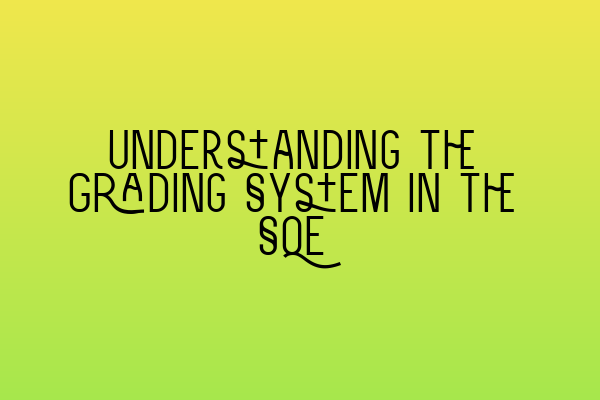Understanding the Grading System in the SQE
Aspiring solicitors who are preparing to take the Solicitors Qualifying Examination (SQE) are often curious about how their performance will be evaluated. The grading system used in the SQE is designed to fairly assess the competencies and knowledge of candidates. In this blog post, we will delve into the various aspects of the grading system in the SQE, providing you with a comprehensive understanding of how your performance will be evaluated.
The SQE is divided into two stages: SQE1 and SQE2. Each stage consists of multiple assessments that evaluate different legal skills and knowledge areas. Let’s discuss the grading system for each stage individually.
SQE1 Grading System
SQE1 focuses on testing candidates’ functioning legal knowledge across a range of key areas. These areas include dispute resolution, contracts and torts, property practice, commercial and corporate practice, and more. The assessments in SQE1 are computer-based, consisting of multiple-choice questions (MCQs) and written tasks.
The grading system in SQE1 is based on a scaled score. Each assessment in SQE1 is worth 180 marks, and the pass mark for each assessment is set at 100. So, in order to pass an assessment, you need to achieve a score of 100 or more. The scaled score takes into account the difficulty of the questions and ensures fairness across different assessments. It is worth noting that there is no negative marking in SQE1, so it is always beneficial to attempt all the questions, even if you are uncertain about the answer.
SQE2 Grading System
SQE2 focuses on testing candidates’ practical legal skills in a simulated practice environment. This stage includes assessments such as client interviewing and attendance note/legal writing. Unlike SQE1, the grading system in SQE2 is not based on a scaled score. Instead, each assessment is graded on a pass/fail basis.
To pass SQE2, candidates need to demonstrate that they have met the required competencies set by the Solicitors Regulation Authority (SRA). These competencies include legal research and a variety of skills across different practice areas. The assessments in SQE2 are designed to mimic real-life scenarios, allowing candidates to showcase their practical legal skills.
Overall Grading and Qualification
To qualify as a solicitor, candidates must pass both SQE1 and SQE2. The overall qualification is not solely based on the assessments’ results but also takes into account the completion of two years of qualifying work experience (QWE). This work experience can be accumulated before, during, or after taking the SQE. It is essential to have a clear understanding of the QWE requirements to ensure that you meet the necessary criteria for qualification.
Preparing for the SQE Grading System
To perform well in the SQE assessments and achieve your desired grades, thorough preparation and revision are key. Utilizing resources and preparation materials that are specifically tailored for the SQE can greatly enhance your chances of success. There are various online courses, study guides, and practice exams available to help you familiarize yourself with the format and content of the assessments.
It is also highly recommended to seek guidance from experienced solicitors or legal professionals who can provide valuable insights and advice on how to approach the SQE assessments.
Related Articles:
If you are studying property practice for the SQE, be sure to check out our article on “Key Topics in SQE Land Law: A Roadmap to Exam Success.” This comprehensive guide covers essential topics and provides valuable tips for exam preparation.
For those interested in planning permission and land use, our article on “Planning Permission and Land Use: Legal Requirements and Considerations” offers insights into the legalities surrounding land use, enabling you to gain a deeper understanding of this topic.
If you are looking for essential tips and resources to help you excel in property practice, our article on “SQE Prep: Essential Tips and Resources for Success in Property Practice” is a must-read. It provides valuable advice and resources to enhance your preparation for the SQE assessments.
Examining land charges is an important aspect of property practice. Our article on “Examining Land Charges: Implications and Considerations” delves into the implications and considerations related to land charges, offering valuable insights for your SQE preparation.
Understanding landlord responsibilities is another crucial topic for property practice. Our article on “Understanding Landlord Responsibilities in the UK: Legal Obligations Explained” provides an in-depth explanation of the legal obligations that landlords must comply with, helping you gain a comprehensive understanding of this area.
In conclusion, the grading system in the SQE is designed to fairly assess candidates’ legal knowledge and practical skills. By understanding the grading criteria for each stage of the SQE and thoroughly preparing for the assessments, you can increase your chances of achieving the desired grades and ultimately qualifying as a solicitor.
Remember, preparation is key, and utilizing relevant resources and seeking guidance from experienced professionals can greatly contribute to your success in the SQE. So, make sure to check out the linked articles above to further enhance your understanding and preparation for the SQE assessments.

Leave a Reply